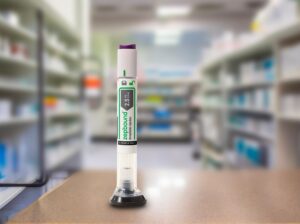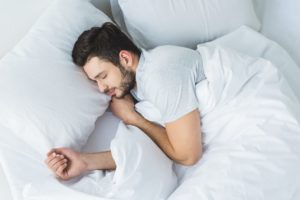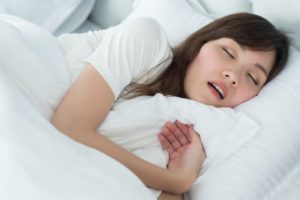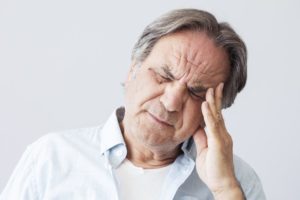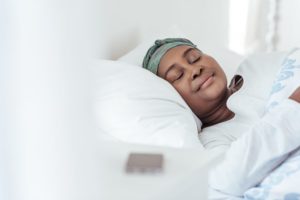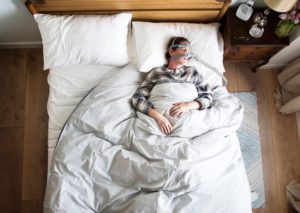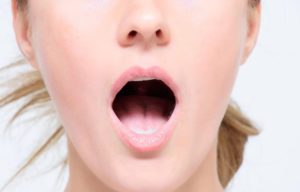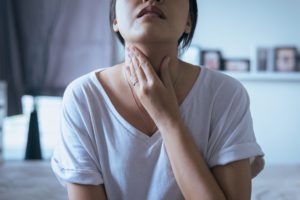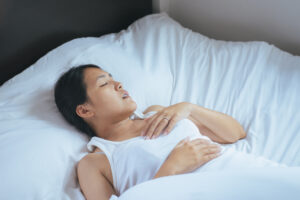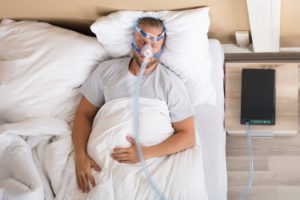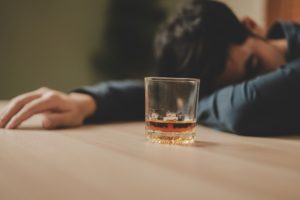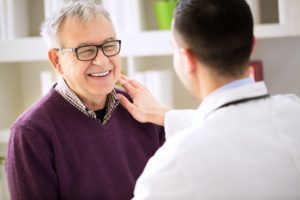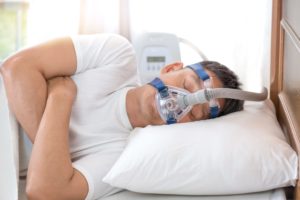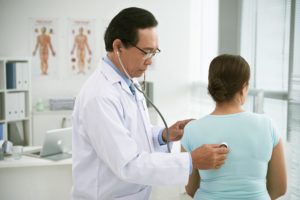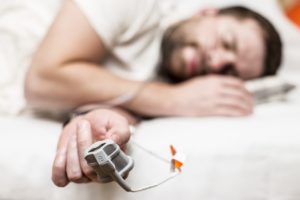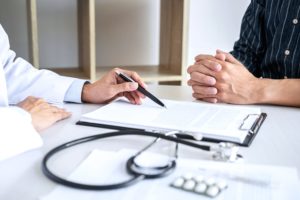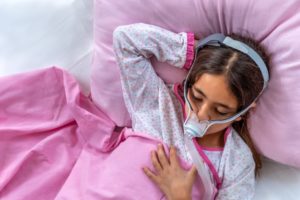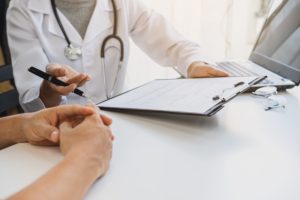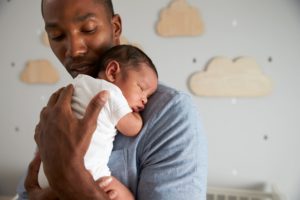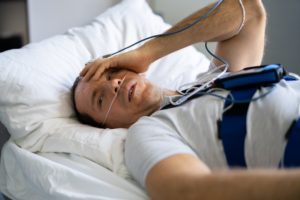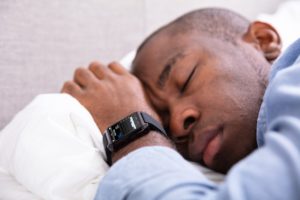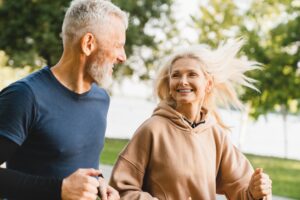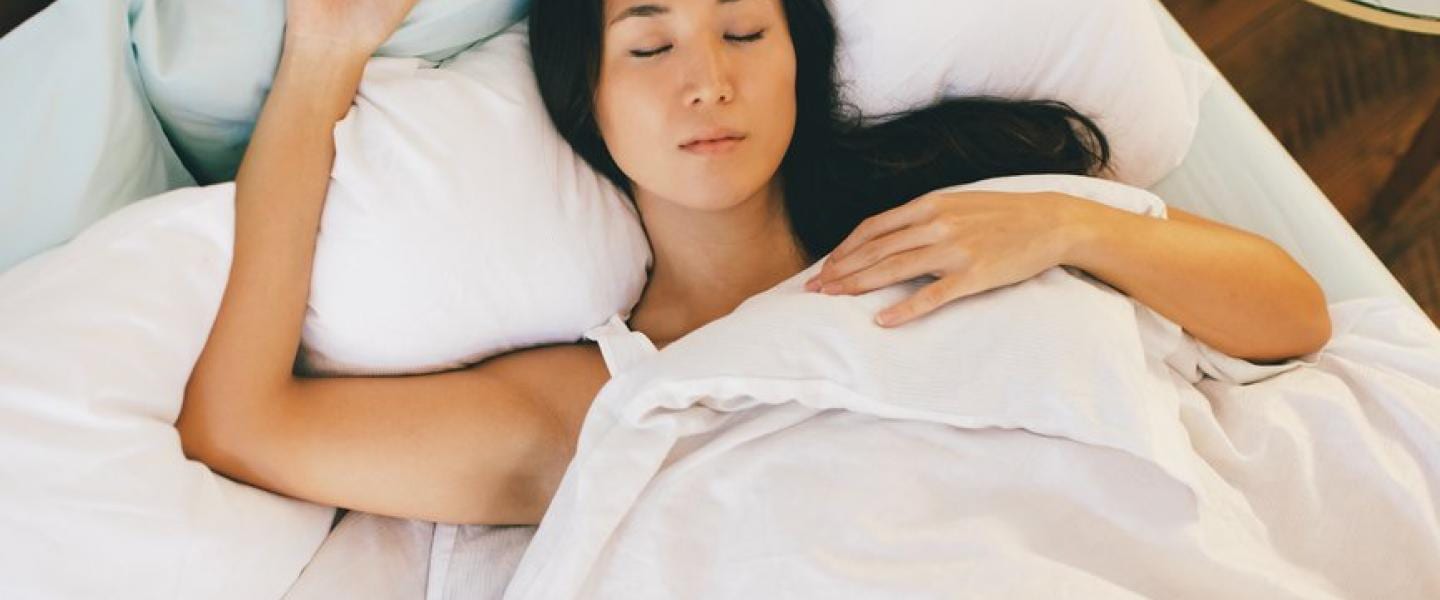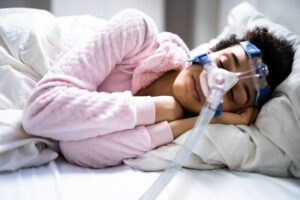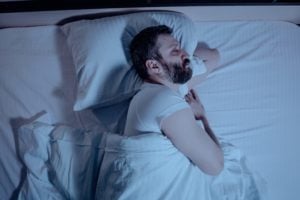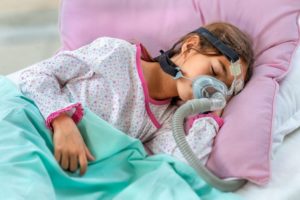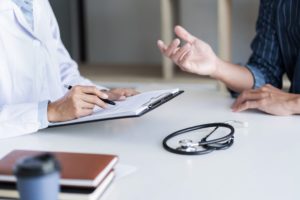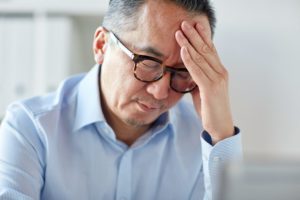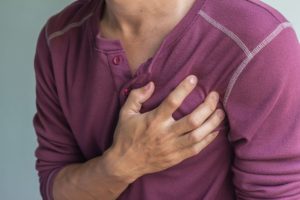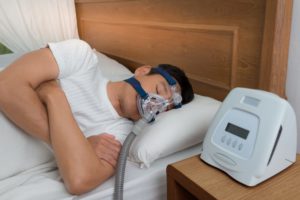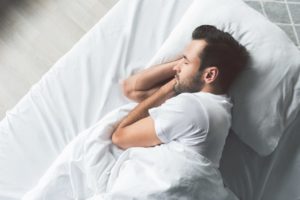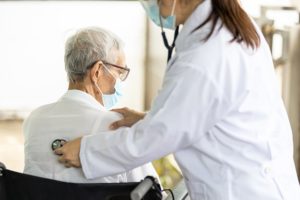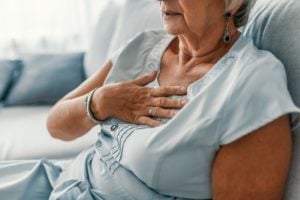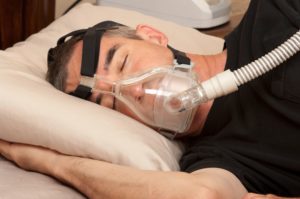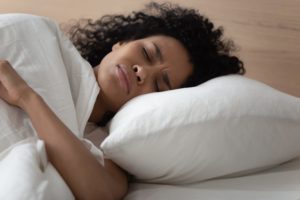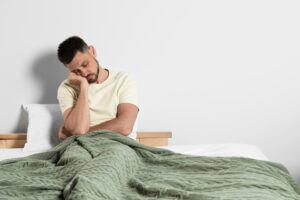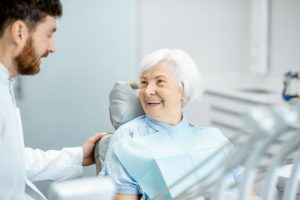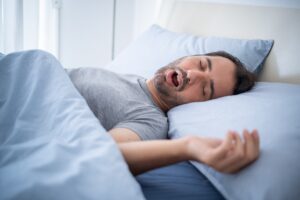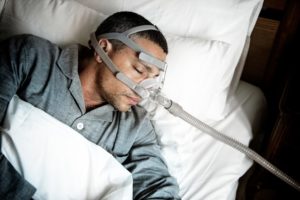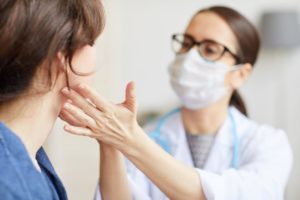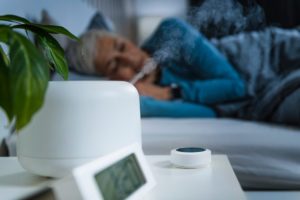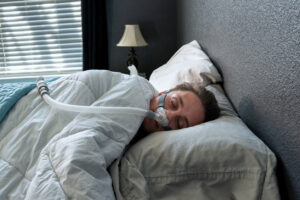Sleep Apnea and COVID
Since early 2020, millions of people in the United States have been diagnosed with the novel coronavirus, commonly called COVID-19. As researchers learn more about COVID, questions have arisen about how the virus affects people with other health issues, including sleep-related breathing disorders like sleep apnea.
Because obstructive sleep apnea (OSA) and COVID-19 are associated with a number of the same health issues, including irregular breathing, disrupted sleep, and the risk of cardiovascular problems, experts continue to study the ways in which sleep apnea and COVID may be related. Evidence so far indicates that sleep apnea does not increase the risk of contracting COVID-19, but people with untreated OSA may be at a higher risk of severe COVID symptoms.
The Relationship Between Sleep Apnea and COVID-19
The overlapping health issues linked to both COVID and sleep apnea have led many researchers to try to understand the relationship between these conditions.
Sleep apnea and COVID can impact many of the same systems of the body. Sleep apnea involves repeated reductions in breathing, and COVID-19 also frequently hinders breathing through its effects on the lungs and respiratory tract. As a result, both sleep apnea and COVID can cause there to be too little oxygen in the blood, which is called hypoxemia.
The cardiovascular system can also be negatively affected by both COVID-19 and sleep apnea. Untreated obstructive sleep apnea can increase the risk of cardiovascular problems like high blood pressure and stroke. Similarly, many patients with COVID have disrupted cardiovascular function .
OSA and COVID-19 are both conditions that frequently affect sleep quality. OSA interferes with sleep by causing frequent awakenings at night as a person wakes up to reestablish a normal breathing pattern. Studies have found that people with COVID also have poor sleep quality , which may be a result of the wide range of symptoms caused by the disease.
While the relationship between COVID and sleep apnea is still not fully understood, studies to date can help answer key questions about the relationship between OSA and COVID-19.
Understand Your Sleep Apnea Risk
Answer three questions to take charge of troubled sleep.
Can COVID Cause Obstructive Sleep Apnea?
COVID-19 is not known to cause or be a risk factor for developing obstructive sleep apnea.
OSA is caused by a narrowing of the upper airway. Although COVID may increase nasal congestion that can restrict airflow, having COVID-19 is not considered to cause OSA in people who do not already have the condition.
Does Obstructive Sleep Apnea Increase the Risk of Getting COVID?
Obstructive sleep apnea does not cause COVID-19. COVID-19 is caused by infection with the SARS-CoV-2 virus, which is transmitted through respiratory droplets or close contact with an infected person. OSA is a sleep disorder that is not contagious or caused by a virus.
Research to date has not found a connection between having OSA and the likelihood of getting infected with COVID. However, people with untreated OSA can experience significant sleep disruptions that may affect their immune health and make them more susceptible to viral infections.
Does Sleep Apnea Increase COVID Severity?
There is some evidence to suggest that people with obstructive sleep apnea are more likely to have severe symptoms and be hospitalized for COVID-19. However, not all studies have shown this effect , so more remains to be learned about how OSA impacts the severity of COVID.
Researchers believe that several factors could help explain the potential connection between OSA and COVID-19 severity.
- Inflammation: Untreated OSA contributes to persistent inflammation in the body, which may trigger more intense reactions by the immune system to a COVID-19 infection.
- Lower blood oxygen levels: Breathing problems from COVID can reduce oxygen in the blood, a problem that could be compounded by breathing interruptions during sleep caused by OSA. This may exacerbate inflammation, spur more rapid viral growth, and heighten the risk of damage to the kidneys or cardiovascular system.
- Overlapping risk factors: People with untreated OSA are at a heightened risk of developing other health conditions that are associated with more severe COVID-19. Examples of these health problems include diabetes, obesity, heart failure, and other cardiovascular diseases.
Because of the potential for OSA to play a role in COVID severity, doctors may review a person’s sleep and sleep-related breathing when assessing their overall health after being diagnosed with COVID.
Does Sleep Apnea Cause Long COVID?
While a great deal is still unknown about the long-term effects of COVID infection, there is some concern that people with OSA could be prone to having longer-lasting COVID symptoms.
Some people who have had COVID-19 experience persistent symptoms or even new symptoms that only arise more than a month after being infected. This is known as long COVID , and it has been estimated to affect more than 6% of people who contract the virus.
Long COVID can cause a wide range of symptoms, including impaired breathing, sleeping problems, and fatigue. OSA can cause similar health issues, and it is possible that having OSA could factor into a person’s long-term recovery from COVID-19. Further research will be needed to clarify any role that OSA plays in the development or persistence of long COVID.
What To Do If You Have Sleep Apnea and Are Infected With COVID-19
People who have obstructive sleep apnea should talk with a doctor if they have COVID-19 or are experiencing symptoms of COVID-19. Consulting with a doctor is especially important for people with sleep apnea who have other health conditions that make them vulnerable to more severe COVID-19 infection.
Other steps, such as monitoring symptoms, reducing viral spread, and keeping sleep apnea treatment equipment clean, may also prove to be helpful steps for people with OSA who contract COVID.

Monitoring Symptoms
People with OSA should keep a careful eye on their symptoms. Although most people with COVID-19 experience only mild symptoms , the condition can worsen and, in some cases, become severe. Prompt medical attention should be sought if symptoms worsen.
Avoiding Viral Spread
People with symptoms of COVID-19 may be contagious and able to spread the virus to other people. For this reason, it is important for people with COVID or COVID symptoms to take steps to reduce transmission of the virus, such as:
- Follow CDC guidelines regarding how long to stay away from others
- Consider getting a COVID-19 vaccine or booster shot
- Isolate in one bedroom and minimizing interaction with family or roommates
- Wear a mask over the mouth and nose when near other people
- Facilitate ventilation and airflow in indoor spaces
- Wash hands thoroughly and frequently
- Disinfect common surfaces
Keep Sleep Apnea Treatment Equipment Clean
People who use a device to treat OSA, such as a continuous positive airway pressure (CPAP) machine, should keep their device and its accessories clean according to the manufacturer’s recommendations.
While it is best to consult with a doctor for specific advice about using and cleaning a CPAP when diagnosed with COVID-19, some evidence suggests that using a CPAP may help decrease the chances of COVID symptoms getting worse .
In order to decrease the risk of spreading the virus, CPAP users may be advised to sleep in a separate room from others in their household.
CPAP Machines and COVID-19
CPAP machines are one the most frequently prescribed treatments for obstructive sleep apnea. These devices send pressurized air through a mask, and that air keeps the airway from becoming obstructed.
Given COVID-19’s ability to interfere with normal breathing and to spread through exhaled air, people with sleep apnea may have questions about CPAP devices and COVID.
Is it Safe to Keep Using a CPAP if You Have COVID-19?
For many people, it is safe to continue using a CPAP if they have symptoms or test positive for COVID-19, but people with OSA should consult with their doctor or sleep specialist for medical advice.
When using a CPAP after testing positive for COVID, various steps may be taken to reduce the risk of viral transmission to other household members.
Do CPAP Machines Spread COVID-19?
There is little evidence that CPAP machines increase the spread of COVID-19. One study found that CPAP machines produce no more aerosol particles than normal breathing, coughing, or talking.
That said, when using a CPAP device, some exhaled air may leak out of the mask. It may be possible that the air pressure from the device could create more aerosolized viral particles that could be spread into the room where the CPAP is being used.
In order to decrease the chances that a household member gets COVID-19, it is best for a person who is sick to sleep in a separate bedroom. The CDC recommends this preventive measure for anyone with COVID, not just those who use a CPAP.
Are CPAP Machines a Type of Treatment for COVID-19?
While CPAP machines are best known for their use in treating sleep apnea, in some circumstances they may be used to treat people who are hospitalized for COVID-19 regardless of whether they have sleep apnea.
Severe COVID-19 can cause serious breathing problems, so treatment may be required to help a person get the oxygen they need. Using a CPAP machine is one way of providing this type of breathing support.
As a treatment for COVID-19, using a CPAP is considered to be a type of non-invasive ventilation. This stands in contrast to more invasive breathing support, such as using a mechanical ventilator.
Central Sleep Apnea and COVID-19
Central sleep apnea (CSA) is caused by an inability of the brain and breathing muscles to properly control breathing. CSA is much less common than OSA, so less research is available about its potential connections to COVID-19.
A few case reports from individual patients have been published about CSA and COVID. These case reports suggest that these conditions have the potential to exacerbate one another, but more detailed studies with more people involved would be necessary to draw conclusions about any connection between CSA and COVID.
When to Contact a Doctor
Working with a doctor is important for anyone who tests positive for COVID-19, has symptoms of severe COVID, or who has warning signs of obstructive sleep apnea.
Seeking Medical Care for COVID-19
The CDC recommends promptly getting a COVID test after the onset of symptoms consistent with the condition. Some of the most common COVID symptoms include:
- Sore throat or cough
- Fever or chills
- Stuffy or runny nose
- Loss of smell or taste
- Fatigue
- Difficulty breathing
- Chest pain or pressure
- Headaches or other body aches
- Digestive upset including diarrhea or nausea
If a COVID test is positive, then it is important to talk with a doctor about the most appropriate next steps, including the possibility of taking medications that may help prevent the development of severe disease.
Seeking Medical Care for Sleep Apnea
A significant number of people who have obstructive sleep apnea do not realize that they have the condition. It is important to talk to a doctor if any of these potential symptoms arise :
- Excessive sleepiness during the day
- Choking or gasping during sleep
- Loud and frequent snoring
- Waking up with headaches
In many cases, a bed partner or household member may be the first to notice certain symptoms.
A person may have these symptoms without having OSA, so consulting with a doctor is necessary to conduct the appropriate testing to check for the condition.
Medical Disclaimer: The content on this page should not be taken as medical advice or used as a recommendation for any specific treatment or medication. Always consult your doctor before taking a new medication or changing your current treatment.

Still have questions? Ask our community!
Join our Sleep Care Community — a trusted hub of sleep health professionals, product specialists, and people just like you. Whether you need expert sleep advice for your insomnia or you’re searching for the perfect mattress, we’ve got you covered. Get personalized guidance from the experts who know sleep best.
References
15 Sources
-
Pena Orbea, C., Wang, L., Shah, V., Jehi, L., Milinovich, A., Foldvary-Schaefer, N., Chung, M. K., Mashaqi, S., Aboussouan, L., Seidel, K., & Mehra, R. (2021). Association of sleep-related hypoxia with risk of COVID-19 hospitalizations and mortality in a large integrated health system. JAMA Network Open, 4(11), e2134241.
https://pubmed.ncbi.nlm.nih.gov/34757409/ -
National Center for Immunization and Respiratory Diseases, Division of Viral Diseases. (n.d.). COVID-19. Centers for Disease Control and Prevention., Retrieved December 23, 2022, from
https://www.cdc.gov/coronavirus/2019-nCoV/index.html -
McIntosh, K. (2022, December 7). COVID-19: Clinical features. In M. S. Hirsch (Ed.). UpToDate., Retrieved December 23, 2022, from
https://www.uptodate.com/contents/covid-19-clinical-features -
National Institutes of Health. (2022, September 26). Oxygenation and ventilation for adults., Retrieved December 23, 2022, from
https://www.covid19treatmentguidelines.nih.gov/management/critical-care-for-adults/oxygenation-and-ventilation-for-adults/ -
Caforio, A. LP. (2022, June 10). COVID-19: Cardiac manifestations in adults. In D. Mancini (Ed.). UpToDate., Retrieved December 23, 2022, from
https://www.uptodate.com/contents/covid-19-cardiac-manifestations-in-adults -
Donzella, S. M., Kohler, L. N., Crane, T. E., Jacobs, E. T., Ernst, K. C., Bell, M. L., Catalfamo, C. J., Begay, R., Pogreba-Brown, K., & Farland, L. V. (2022). COVID-19 infection, the COVID-19 pandemic, and changes in sleep. Frontiers in Public Health, 9, 795320.
https://pubmed.ncbi.nlm.nih.gov/35174134/ -
Strausz, S., Kiiskinen, T., Broberg, M., Ruotsalainen, S., Koskela, J., Bachour, A., FinnGen, Palotie, A., Palotie, T., Ripatti, S., & Ollila, H. M. (2021). Sleep apnoea is a risk factor for severe COVID-19. BMJ open respiratory research, 8(1), e000845.
https://pubmed.ncbi.nlm.nih.gov/33436406/ -
Ho, J. P. T. F., Donders, H. C. M., Zhou, N., Schipper, K., Su, N., & de Lange, J. (2021). Association between the degree of obstructive sleep apnea and the severity of COVID-19: An explorative retrospective cross-sectional study. PloS One, 16(9), e0257483.
https://pubmed.ncbi.nlm.nih.gov/34529732/ -
Mikkelsen, M. E., & Abramoff, B. (2022, November 18). COVID-19: Evaluation and management of adults with persistent symptoms following acute illness (“Long COVID”). In S. Manaker & J. G. Elmore (Eds.). UpToDate., Retrieved December 23, 2022, from
https://www.uptodate.com/contents/covid-19-evaluation-and-management-of-adults-with-persistent-symptoms-following-acute-illness-long-covid -
UpToDate. (n.d.). Patient education: COVID-19 overview (The basics). UpToDate., Retrieved December 23, 2022, from
https://www.uptodate.com/contents/covid-19-overview-the-basics -
Sampol, J., Sáez, M., Martí, S., Pallero, M., Barrecheguren, M., Ferrer, J., Sampol, G., & Vall d’Hebron COVID-19 Working Group (2022). Impact of home CPAP-treated obstructive sleep apnea on COVID-19 outcomes in hospitalized patients. Journal of Clinical Sleep Medicine, 18(7), 1857–1864.
https://pubmed.ncbi.nlm.nih.gov/35404224/ -
American Academy of Sleep Medicine. (n.d). COVID-19 resources., Retrieved December 23, 2022, from
https://aasm.org/covid-19-resources/ -
Hamilton, F. W., Gregson, F., Arnold, D. T., Sheikh, S., Ward, K., Brown, J., Moran, E., White, C., Morley, A. J., AERATOR Group, Bzdek, B. R., Reid, J. P., Maskell, N. A., & Dodd, J. W. (2022). Aerosol emission from the respiratory tract: an analysis of aerosol generation from oxygen delivery systems. Thorax, 77(3), 276–282.
https://pubmed.ncbi.nlm.nih.gov/34737195/ -
Anesi, G. L. (2022, October 3). COVID-19: Respiratory care of the nonintubated hypoxemic adult (supplemental oxygen, noninvasive ventilation, and intubation). In S. Manaker (Ed.) UpToDate., Retrieved December 23, 2022, from
https://www.uptodate.com/contents/covid-19-respiratory-care-of-the-nonintubated-hypoxemic-adult-supplemental-oxygen-noninvasive-ventilation-and-intubation -
Ghatak, R., & Saini, V. (2022). SARS-CoV-2 causing transient central sleep apnea in patients treated for obstructive sleep apnea with continuous positive airway pressure. The American Journal of Case Reports, 23, e937427.
https://pubmed.ncbi.nlm.nih.gov/36171691/


